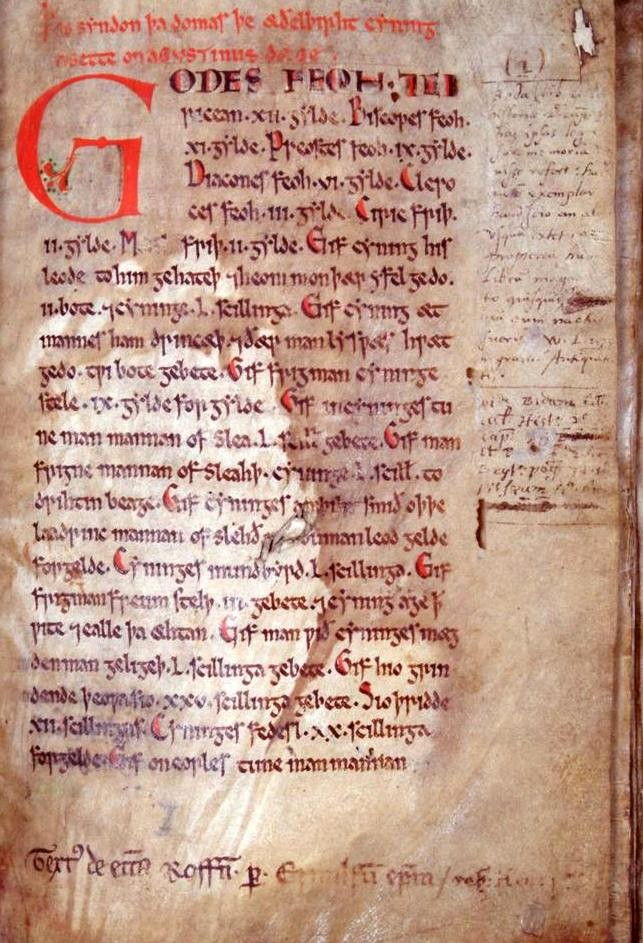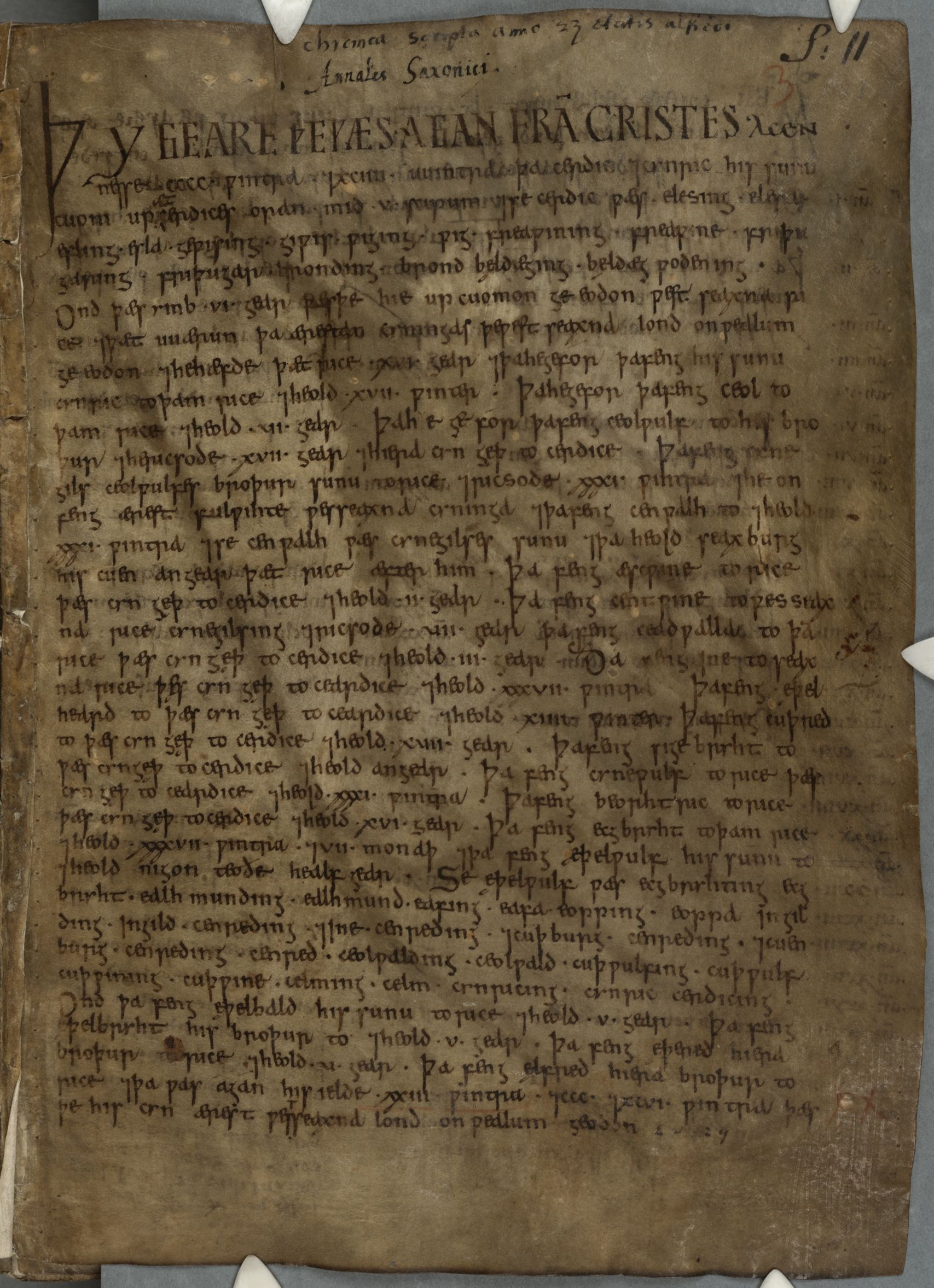|
Wihtred Of Kent
Wihtred ( la, Wihtredus) ( – 23 April 725) was king of Kent from about 690 or 691 until his death. He was a son of Ecgberht I and a brother of Eadric. Wihtred ascended to the throne after a confused period in the 680s, which included a brief conquest of Kent by Cædwalla of Wessex, and subsequent dynastic conflicts. His immediate predecessor was Oswine, who was probably descended from Eadbald, though not through the same line as Wihtred. Shortly after the start of his reign, Wihtred issued a code of laws—the Law of Wihtred—that has been preserved in a manuscript known as the ''Textus Roffensis''. The laws pay a great deal of attention to the rights of the Church (of the time period), including punishment for irregular marriages and for pagan worship. Wihtred's long reign had few incidents recorded in the annals of the day. He was succeeded in 725 by his sons, Æthelberht II, Eadberht I, and Alric. Kent in the late seventh century The dominant force in la ... [...More Info...] [...Related Items...] OR: [Wikipedia] [Google] [Baidu] |
King Of Kent
This is a list of the kings of the Anglo-Saxon Kingdom of Kent. The regnal dates for the earlier kings are known only from Bede. Some kings are known mainly from charters, of which several are forgeries, while others have been subjected to tampering in order to reconcile them with the erroneous king lists of chroniclers, baffled by blanks, and confused by concurrent reigns and kings with similar or identical names. It is commonplace for the later kings to be referred to as subkings, but the actual rank used is always ''rex'', never ''regulus'' (except for a late legend concerning Eormenred). The usual style was simply King of Kent (''rex Cantiae'') or King of the Kentish Men (''rex Cantuariorum''). Territorial division within Kent is not alluded to, except by Eadberht I (''rex Cantuariorum terram dimidii'') and Sigered (''rex dimidie partis prouincie Cantuariorum''). List of kings of Kent See also *List of English monarchs *Kentish Royal Legend *Anglo-Saxon royal genealogie ... [...More Info...] [...Related Items...] OR: [Wikipedia] [Google] [Baidu] |
Bede
Bede ( ; ang, Bǣda , ; 672/326 May 735), also known as Saint Bede, The Venerable Bede, and Bede the Venerable ( la, Beda Venerabilis), was an English monk at the monastery of St Peter and its companion monastery of St Paul in the Kingdom of Northumbria of the Angles (contemporarily Monkwearmouth–Jarrow Abbey in Tyne and Wear, England). Born on lands belonging to the twin monastery of Monkwearmouth–Jarrow in present-day Tyne and Wear, Bede was sent to Monkwearmouth at the age of seven and later joined Abbot Ceolfrith at Jarrow. Both of them survived a plague that struck in 686 and killed a majority of the population there. While Bede spent most of his life in the monastery, he travelled to several abbeys and monasteries across the British Isles, even visiting the archbishop of York and King Ceolwulf of Northumbria. He was an author, teacher (Alcuin was a student of one of his pupils), and scholar, and his most famous work, ''Ecclesiastical History of the English People ... [...More Info...] [...Related Items...] OR: [Wikipedia] [Google] [Baidu] |
Anglo-Saxon Chronicle
The ''Anglo-Saxon Chronicle'' is a collection of annals in Old English, chronicling the history of the Anglo-Saxons. The original manuscript of the ''Chronicle'' was created late in the 9th century, probably in Wessex, during the reign of Alfred the Great (r. 871–899). Multiple copies were made of that one original and then distributed to monasteries across England, where they were independently updated. In one case, the ''Chronicle'' was still being actively updated in 1154. Nine manuscripts survive in whole or in part, though not all are of equal historical value and none of them is the original version. The oldest seems to have been started towards the end of Alfred's reign, while the most recent was written at Peterborough Abbey after a fire at that monastery in 1116. Almost all of the material in the ''Chronicle'' is in the form of annals, by year; the earliest are dated at 60 BC (the annals' date for Caesar's invasions of Britain), and historical material follows up t ... [...More Info...] [...Related Items...] OR: [Wikipedia] [Google] [Baidu] |
Ine Of Wessex
Ine, also rendered Ini or Ina, ( la, Inus; c. AD 670 – after 726) was King of Wessex from 689 to 726. At Ine's accession, his kingdom dominated much of southern England. However, he was unable to retain the territorial gains of his predecessor, Cædwalla, who had expanded West Saxon territory substantially. By the end of Ine's reign, the kingdoms of Kent, Sussex, and Essex were no longer under West Saxon sway; however, Ine maintained control of what is now Hampshire, and consolidated and extended Wessex's territory in the western peninsula. Ine is noted for his code of laws (''Ines asetnessa'' or "laws of Ine"), which he issued in about 694. These laws were the first issued by an Anglo-Saxon king outside Kent. They shed much light on the history of Anglo-Saxon society, and reveal Ine's Christian convictions. Trade increased significantly during Ine's reign, with the town of Hamwic (now Southampton) becoming prominent. It was probably during Ine's reign that the West Saxons be ... [...More Info...] [...Related Items...] OR: [Wikipedia] [Google] [Baidu] |
Wessex
la, Regnum Occidentalium Saxonum , conventional_long_name = Kingdom of the West Saxons , common_name = Wessex , image_map = Southern British Isles 9th century.svg , map_caption = Southern Britain in the ninth century , event_start = Established , year_start = 519 , event_end = English unification , year_end = 12 July 927 , event1 = , date_event1 = , event_pre = Settlement , date_pre = 5th–6th century , event_post = Norman conquest , date_post = 14 October 1066 , border_s2 = no , common_languages = Old English *West Saxon dialect British Latin , religion = PaganismChristianity , leader1 = Cerdic (first) , leader2 = Ine , leader3 = Ecgberht , leader4 = Alfred the Great , leader5 ... [...More Info...] [...Related Items...] OR: [Wikipedia] [Google] [Baidu] |
Synod Of Baccanceld
The Synod of Baccanceld is said to have been held in Bapchild, Kent at the end of the seventh or beginning of the eighth century. According to the 1913 Catholic Encyclopedia: :This meeting was rather a witenagemot, or Anglo-Saxon Parliament or Royal Council (in Christian kingdoms often including clerics), rather than an ecclesiastical synod, as it was presided over by Wihtred, King of Kent. There were present at its deliberations Berhtwald, Archbishop of Canterbury, and Tobias, Bishop of Rochester, besides abbots, abbesses, priests, deacons and lay lords. The chief enactments are embodied in a charter whose terms secured to the Church forever the donations and privileges bestowed on it by the laity, since "what had once been given to God might never be resumed to man's use". Moreover, on the death of prelates, fitting successors were to be appointed with the advice and approval of the archbishop, without any royal intervention; such action would nullify the election; and lay interf ... [...More Info...] [...Related Items...] OR: [Wikipedia] [Google] [Baidu] |
Archbishop Of Canterbury
The archbishop of Canterbury is the senior bishop and a principal leader of the Church of England, the ceremonial head of the worldwide Anglican Communion and the diocesan bishop of the Diocese of Canterbury. The current archbishop is Justin Welby, who was enthroned at Canterbury Cathedral on 21 March 2013. Welby is the 105th in a line which goes back more than 1400 years to Augustine of Canterbury, the "Apostle to the English", sent from Rome in the year 597. Welby succeeded Rowan Williams. From the time of Augustine until the 16th century, the archbishops of Canterbury were in full communion with the See of Rome and usually received the pallium from the pope. During the English Reformation, the Church of England broke away from the authority of the pope. Thomas Cranmer became the first holder of the office following the English Reformation in 1533, while Reginald Pole was the last Roman Catholic in the position, serving from 1556 to 1558 during the Counter-Reformation. ... [...More Info...] [...Related Items...] OR: [Wikipedia] [Google] [Baidu] |
Bertwald
Berhtwald (died 731) was the ninth Archbishop of Canterbury in England. Documentary evidence names Berhtwald as abbot at Reculver before his election as archbishop. Berhtwald begins the first continuous series of native-born Archbishops of Canterbury, although there had been previous Anglo-Saxon archbishops, they had not succeeded each other until Berhtwald's reign. Berhtwald's period as archbishop coincided with the end of Wilfrid's long struggle to regain the Bishopric of York, and the two-year delay between Theodore's death and Berhtwald's election may have been due to efforts to select Wilfrid for Canterbury. After his election, Berhtwald went to Gaul for consecration and then presided over two councils that attempted to settle the Wilfrid issue, finally succeeding at the second council in 705. Berhtwald also was the recipient of the first surviving letter close in Western Europe. Early life Little is known of Berhtwald's ancestry or his early life, but he was born arou ... [...More Info...] [...Related Items...] OR: [Wikipedia] [Google] [Baidu] |
St Augustine's Abbey
St Augustine's Abbey was a Benedictine monastery in Canterbury, Kent, England. The abbey was founded in 598 and functioned as a monastery until its dissolution in 1538 during the English Reformation. After the abbey's dissolution, it underwent dismantlement until 1848. Since 1848, part of the site has been used for educational purposes (used as boarding houses and a library by The King's School, Canterbury) and the abbey ruins have been preserved for their historical value. From founding until dissolution In 597, Augustine arrived in England, having been sent by the missionary-minded Pope Gregory I to convert the Anglo-Saxons.England's Christian Heritage: Kent Guide at englandschristianheritage.org.uk, accessed 2 July 2013 The |
DESCENDANTS OF EADBALD OF KENT
Descendant(s) or descendent(s) may refer to: * Lineal descendant, a consanguinous (i.e. biological) relative directly related to a person ** Collateral descendant, a relative descended from a brother or sister of an ancestor Books * "The Descendant" (short story), a short story by early 20th-century science-fiction writer H. P. Lovecraft * ''The Descendants'' (novel), a 2007 novel by Kaui Hart Hemmings Film and television * ''Descendant'' (2003 film), a thriller film starring Katherine Heigl and Jeremy London * ''Descendants'' (2008 film), an animated short film, Winner Tokyo Anime Award 2009 * ''Descendents'' (2008 film), a Chilean experimental horror film * ''The Descendants'', a 2011 American drama film directed by Alexander Payne with George Clooney * ''The Descendants'' (2015 film), an Iranian film directed by Yaser Talebi * ''Descendants'' (franchise), a Disney Channel television film franchise ** ''Descendants'' (2015 film), the television film that started the above ... [...More Info...] [...Related Items...] OR: [Wikipedia] [Google] [Baidu] |
Swæfheard
Swæfheard was a king of Kent, reigning jointly with Oswine, Wihtred, and possibly Swæfberht. Swæfheard's chartedated 1 March 689, in the second year of his reign, identifies his father as Sæbbi of Essex, Sæbbi, King of Essex (''ac consensu patris mei Sebbe regis''). He witnessed two charters of Oswinebr>http://www.anglo-saxons.net/hwaet/?do=seek&query=S+14], one of which is dated 27 January 690. Swæfheard apparently ruled West Kent as a sub king under his father, while Oswine ruled the eastern ... [...More Info...] [...Related Items...] OR: [Wikipedia] [Google] [Baidu] |



